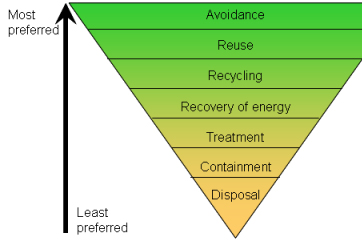
For the nation of Zimbabwe to tackle the waste management challenge that is confronting most urban local authorities, there is need to adopt an integrated solid waste management approach. This involves incorporating the main components of the waste management hierarchy, namely; avoidance of waste generated, reuse, recycling, energy recovery, containment and as a last resort, disposal in properly engineered landfills.
The waste management hierarchy reflects the relative sustainability of each waste management option. In order to be as sustainable as possible, all waste should be dealt with using an option as high up the hierarchy as possible.
What this means is that the majority of time and effort should be spent on avoiding the generation of waste in the first place. If you can’t prevent then reuse. If you can’t reuse, recycle. If you can’t recycle, recover and so on. Disposing of the waste should be the last option.
What is recycling?
Recycling is the process of collecting and processing materials that would otherwise be thrown away as trash and turning them into new products. For example, aluminium cans may be melted (processed) and then either reformed as aluminium cans or made into other aluminium products. Similarly, plastic can be melted, cooled, crushed into pellets which will then make other plastic products such as bin liners, irrigation pipes, buckets and bed linen, among others. For recycling to be effective and hustle free, there is need to separate waste at source.
Waste separation at source
Waste categories include; paper, plastic, metals, glass and biodegradable material, among others. Separating the waste enables one to supply the various players who need the different materials and prevents contamination. Contaminated waste needs thorough cleaning before it is processed and is a burden to the recycler.
For effective waste separation, it is prudent to have separate bins at source where people can categorically place the waste.
- Chamisa under fire over US$120K donation
- Mavhunga puts DeMbare into Chibuku quarterfinals
- Pension funds bet on Cabora Bassa oilfields
- Councils defy govt fire tender directive
Keep Reading
Therefore, after separating the waste, the material is taken to the right players for recycling.
Status of recycling in Zimbabwe
The waste generated in Zimbabwe presents opportunities for the waste recycling industry. Waste is waste to one but to another is a raw material to produce something “new”. The Environmental Management Agency (EMA) is working with several innovators who have identified a niche in using what others feel like discarding as their raw materials.
Some communities who might be lacking in technology and resources have identified opportunities in becoming tributaries to recycling entrepreneurs adopting waste recovery and collecting as their core livelihood strategy by converting trash to cash.”
Benefits of recycling
It aims to bring out business opportunities in waste management so that different stakeholders can play a part in waste management. As such, waste will under this concept bear a price tag.
l Reduces the amount of waste sent to landfills and combustion facilities.
l Conserves natural resources such as timber, water and minerals.
l Prevents pollution by reducing the need to collect new raw materials.
Saves energy
l Reduces greenhouse gas emissions that contribute to global climate change.
l Helps sustain the environment for future generations.
l Helps create new well-paying jobs in the recycling and manufacturing industries.
September, clean up month
September has been set aside as the Clean-up Zimbabwe Month. A number of anti-litter activities have been conducted around the country comprising clean up campaigns, roadblocks, prosecutions, sourcing of bins and raising awareness. To date more than 300 clean up campaigns have been conducted and approximately 60 000cm3 of garbage have been removed in different parts of the country.
Invitation to Environmental Conference and Exhibition
All this is a build up to the Inaugural International Environmental Conference and Exhibition to be held from October 12-13 2017 at the Harare International Conference from 8am to 4:30pm daily. An environmental march and clean-up will take place on October 11 2017 in Harare Central Business District as a conference precursor. The theme for this year’s conference is Zero Tolerance To Litter — Everyone’s responsibility.
Attendance is free of charge, but pre-registration is a requirement to allow for the smooth running of the conference. Exhibition package includes a 3m x 3m shell scheme at a cost of $300 (a table, 2 x chairs, 2 x spot lights, access to power, company facia name).
To register, contact the organiser on Cell: +263 774 505 493 or Tel: +263 4 747755 or [email protected] or Environmental Management Agency on toll free 08080028 WhatsApp 0779 565 707 Email: [email protected] A clean, safe and healthy environment, a possibility through concerted effort!











